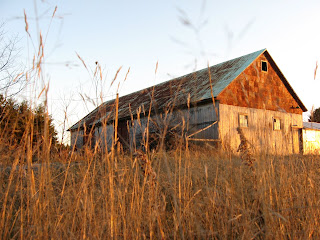It's sort of conventional wisdom these days, spread by "food writers" like Michael Pollan and Barbara Kingsolver, that the more you know about the way your food is produced -- the more you appreciate how much hard work went into the meal you eat -- then the more you'll enjoy eating it. And I suppose this is true, up to a point. There's something very nice about finishing a long day's work, dirty and exhausted, and sitting down to a dinner whose ingredients you helped gather from the fields only a few hours ago. But there's also something very nice about waking up around noon or so, lazing around the house all day, and eating food produced entirely through someone else's hard work. Often, after I cook, I find that I have less of an appetite than when someone else cooks for me. And when I have known the carrots on my plate ever since I pulled them from the ground, caked with mud; when I have known the loaf of bread on the table since it was just a bowl of flour and a couple hundred grams of walnuts or olives... I wouldn't say that it loses any of its flavor, only that it loses the magic of appearing before you for the first time in fully finished form, as if entirely effortless. So it's great to know where your food comes from. It's also nice sometimes to be a little ignorant.
That being said, I did make a couple of pumpkin pies today. From scratch, no less. You may think that a pumpkin is only something that children carve at Halloween, or else something that comes only in pre-spiced, pre-pureed canned form. But it is in fact still possible, despite all the efforts of the industrial-food complex, to make a pumpkin pie from an actual pumpkin or two. It's not that difficult; it just takes a little more time. But I think it's worth it.
Here are some pictures from my month in Quebec:
Quebec City




Lina's farm and Mauricie




Montreal




I got back to Larchmont last night, after a ten-hour train ride from Montreal that turned into more of a twelve-hour train ride, on account of signal failures and passing freight trains (much of the route, apparently, is single-tracked). The train to Montreal is known as the "Adirondack," but I can't really tell you whether or not it passes through the Adirondacks, since the sun went down at about 4:00 and we spent much of the time before that moving very slowly or not at all, waiting for other trains to go by or for the customs officials to finish their examination. You know how the customs forms always ask you questions about what you did on your trip and what you're bringing back with you (including one question that rather amusingly asked if I was bringing back any "cell cultures, disease agents, or snails")? And you know how there's always the question that asks if you've visited any farms or been in contact with any livestock -- a very silly question, since who goes to a farm during their vacation? Well, I did, and, shuddering as I checked the "yes" box, I tried to imagine what kind of special examination they might put me through.
It ended up being nothing more than a cursory glance at my boots. Satisfied that I was not bringing any potentially catastrophic nematodes into the country, the customs official let me pass.
I'm in Larchmont until early February, and I can't really guarantee that anything interesting enough will happen to me between now and then to warrant another blog post. My parents have, for some reason, demanded that I do something productive with these two and a half months, so I suppose it's possible. So keep checking back every once in a while, if you'd like, and I'll certainly try to pick things up again once I go to India in February.
P.S. I've changed the settings so that now (I think) anyone can leave a comment, without having to sign in or create a Google account. If you were unable to post a comment before, try again and let me know if it works.